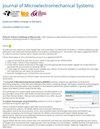电喷雾离子液体流量控制器
IF 2.5
3区 工程技术
Q2 ENGINEERING, ELECTRICAL & ELECTRONIC
引用次数: 0
摘要
离子液体广泛应用于化学、微流体、航空航天和其他各种领域。微流控应用通常需要较小的占地面积,并在其通道中管理微升或更小数量级的流体。许多微流体设备利用外部压力系统或机械泵机制来控制流体流过设备,从而限制了设备的占地面积。开放式微通道微流体至少有一个流体边界向环境开放,而不是通道壁表面完全封闭液体。电喷雾推进器是一种很有希望应用于航天器推进的微尺度流体系统。电喷雾推进器利用离子液体作为推进剂,通过电场加速离子以产生推力。目前,这些推进系统几乎没有尺寸合适的主动推进剂管理选项,导致整个系统的稳健性低于预期。为了在这些小型电喷雾航天器推进系统中用作微型离子液体推进剂管理装置,我们提出了一种固态流量控制器。通过在开放式微通道流体路径中加入电润湿区域,只要接触角在电润湿通道区域内自由变化,就能通过电润湿效应实现液体压力的变化。在硅材料中制作了各种开放式微通道并进行了测试,结果表明,开放式微通道凸缘的圆形化可以防止液体沿通道钉扎,从而使接触角的变化通过电润湿作用表现为通道内液体压力的变化,展示了一种可用于电喷雾推进系统的固态离子液体流量控制器。[2023-0191]本文章由计算机程序翻译,如有差异,请以英文原文为准。
Electrowetting Ionic Liquid Flow Controller
Ionic liquids are used in a variety of chemical, microfluidic, aerospace, and other diverse applications. Microfluidic applications often require a small footprint and manage small volumes of fluid in their channels on the order of microliters or less. Many microfluidic devices utilize external pressure systems or mechanical pumping mechanisms to control the flow of fluids through the device, inherently limiting the footprint of the device. Open microchannel microfluidics have at least one fluid boundary open to the environment instead of a channel wall surface confining liquid completely. A promising micro-scale fluid system for spacecraft propulsion applications is the electrospray thruster. Electrospray thrusters utilizes ionic liquids for propellant whereby ions are accelerated via electric field for thrust. These propulsion systems currently have few suitably sized active propellant management options, leaving the overall system less robust than desired. For use as a micro-scale ionic liquid propellant management device in these small electrospray spacecraft propulsion systems, a solid-state flow controller is proposed. By including an electrowetting region within an open microchannel fluid path, a change in liquid pressure can be achieved via electrowetting effect so long as contact angle is free to change within the electrowetting channel region. Various open microchannels are fabricated in silicon and tested, showing that rounding of the open microchannel ledges prevents liquid pinning along the channel, allowing for contact angle changes via electrowetting to manifest a change in pressure within the liquid in the channel, demonstrating a solid-state ionic liquid flow controller for use in electrospray propulsion systems. [2023-0191]
求助全文
通过发布文献求助,成功后即可免费获取论文全文。
去求助
来源期刊

Journal of Microelectromechanical Systems
工程技术-工程:电子与电气
CiteScore
6.20
自引率
7.40%
发文量
115
审稿时长
7.5 months
期刊介绍:
The topics of interest include, but are not limited to: devices ranging in size from microns to millimeters, IC-compatible fabrication techniques, other fabrication techniques, measurement of micro phenomena, theoretical results, new materials and designs, micro actuators, micro robots, micro batteries, bearings, wear, reliability, electrical interconnections, micro telemanipulation, and standards appropriate to MEMS. Application examples and application oriented devices in fluidics, optics, bio-medical engineering, etc., are also of central interest.
 求助内容:
求助内容: 应助结果提醒方式:
应助结果提醒方式:


